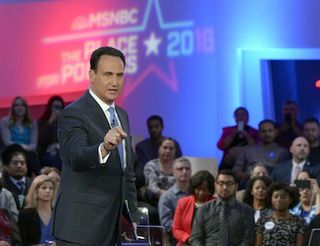Network News Crews Keep Eye on Hispanic Voter Surge

Related: Election Night Viewers’ Guide
It is entirely possible that Latinos, with their numbers around 57 million in the U.S., will decide the presidential election. A headline in Tuesday’s New York Times trumpeted, “The Hispanic Voter Surge Was a Myth in 2012. But Not This Time.” News networks—and those who cater to a Hispanic audience in particular—are paying intensely close attention to the Latino vote’s impact on Trump-Clinton 2016.
Jose Diaz-Balart, anchor at Telemundo News, suggests that what the English-language media sees as a recent phenomenon has been a real factor for much longer. Tenacious voter registration campaigns, alongside continued immigration gains, have elevated the Hispanic community to a full-on force in the U.S. electorate. A polarizing candidate such as GOP standard-bearer Donald Trump has given the Hispanic community, itself broad and diverse, a singular focus, say election watchers.
It was way back in June 2015 that Trump infamously said that Mexico was sending criminals and rapists to the U.S., rankling the Hispanic community. So perhaps it’s fitting that group may decide who wins the presidency. “We are a full-fledged, permanent and constant part of the American fabric," says Diaz-Balart, who notes that 53,000 Hispanics reach voting age every month. “Millions and millions and millions will be participating. A lot will be voting against something more than they are voting for something.”
Diaz-Balart and Maria Celeste Arraras anchor Telemundo’s Batalla Final Tuesday. Over at cable net Fusion, which is owned by Univision Communications, Alicia Menendez anchors live coverage and pops up on the whimsical Roast and Results special at 9 p.m.
Menendez is paying close attention to the Hispanic vote. “Early voting in a number of key states indicates that it may have a big impact,” she says, while noting that other segments of the population—African-Americans, white voters without college degrees, millennials—can all sway the race too.
Millennials may be derided as being detached from the process, but Menendez tells a different story after toiling on the front lines of the election. “[Millennials] are the ones who have the most to gain and lose by who is elected,” she says. “They are so invested and involved. And it’s not just the horse race—it’s the issues that are underpinning this election.”
Broadcasting & Cable Newsletter
The smarter way to stay on top of broadcasting and cable industry. Sign up below
Menendez says the issues, not the “small-p politics,” drive the highest social engagement among millennials.
It’s not just the networks with large Latino audiences that are keeping close watch on the Hispanic surge. “It’s a very interesting story,” says CBS News Washington bureau chief Chris Isham. “It’s something that we’ll track very closely.”
Isham mentions another slice of the electorate that merits scrutiny—the so-called secret cache of Trump voters that reportedly have eluded the pollsters’ inquiries.
Eyes on Sunshine State
Florida is once again key to both parties’ fortunes; it’s believed that Donald Trump absolutely needs to win the Sunshine State to have any path to 270 electoral votes. Latinos number 16% of the population there, and early voting shows a considerable advantage for Hillary Clinton. David Adams, Univision Digital senior editor (English-language news), says it would take a “huge surge” by Trump voters on Tuesday—around an 8% advantage—to tip the scales for Trump. “We share this notion of a [Hispanic] surge,” he says.
Univision’s polls see Clinton winning the state by 2.2%: 48.6% vs. 46.4%. Without the Hispanic vote, the polls say Trump would win Florida by 4 ½ points. “If Hillary wins Florida, there’s no question that Hispanic vote has been fundamental, and possibly decisive,” Adams says.
Clinton holds a 60%-26% lead among Hispanic voters nationwide, according to a poll from Upshot/Siena Florida. It may at times be challenging to keep coverage down the middle when much of one’s viewership is leaning left, but Diaz-Balart says the fundamentals of journalism aren’t swayed by viewer sentiment. “I really believe that informing people on all the issues and all the sides is better for America,” he says. “People can make up their minds based on knowing all the issues.”
Tuesday is essentially the Super Bowl for news networks, their news gatherers and numbers crunchers icing up the Red Bulls for a long night that may not even yield a resolution. Menendez acknowledges that some viewers at pop culture-focused Fusion are a bit burnt out on Hillary versus Donald. “This is where we benefit from not doing 24/7 election coverage,” she says. “There’s also an appetite for more diverse content, because everyone’s brain needs a break.”
Michael Malone, senior content producer at B+C/Multichannel News, covers network programming, including entertainment, news and sports on broadcast, cable and streaming; and local broadcast television. He hosts the podcasts Busted Pilot, about what’s new in television, and Series Business, a chat with the creator of a new program, and writes the column “The Watchman.” He joined B+C in 2005. His journalism has also appeared in The New York Times, The Philadelphia Inquirer, Playboy and New York magazine.

